

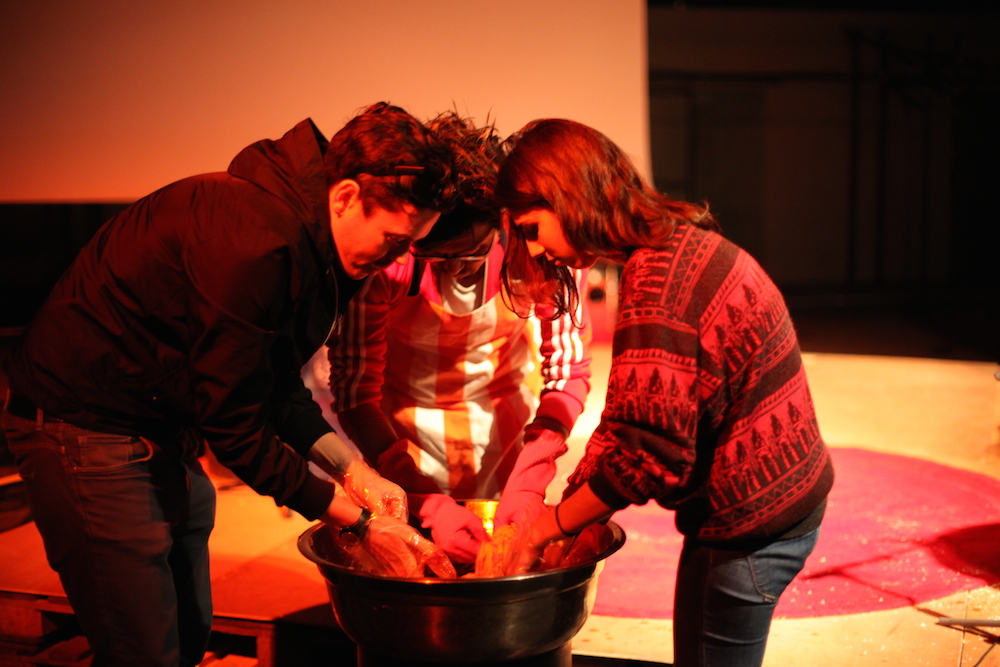
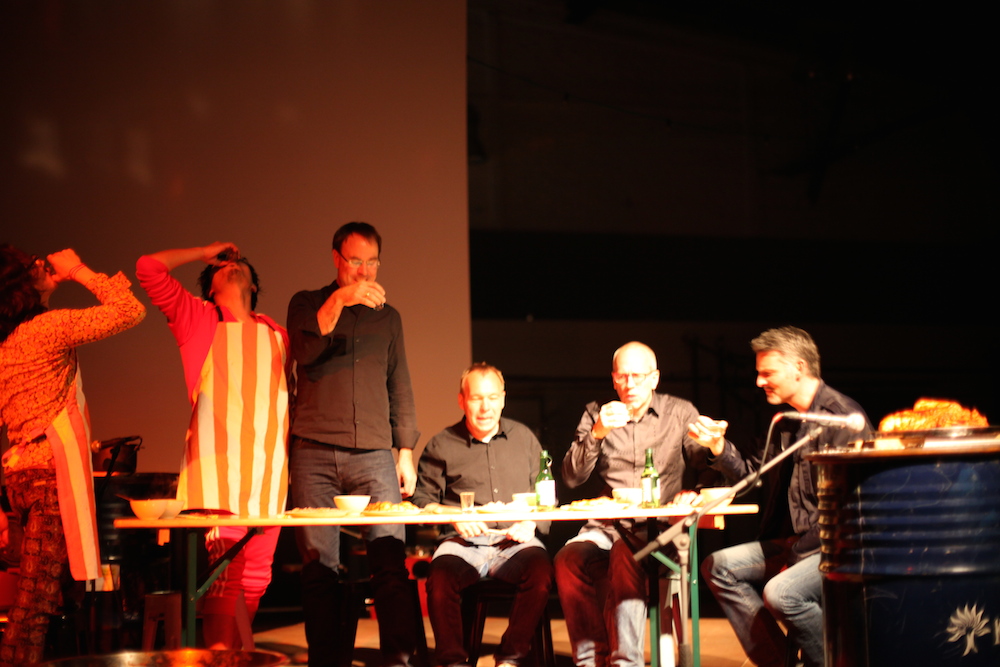
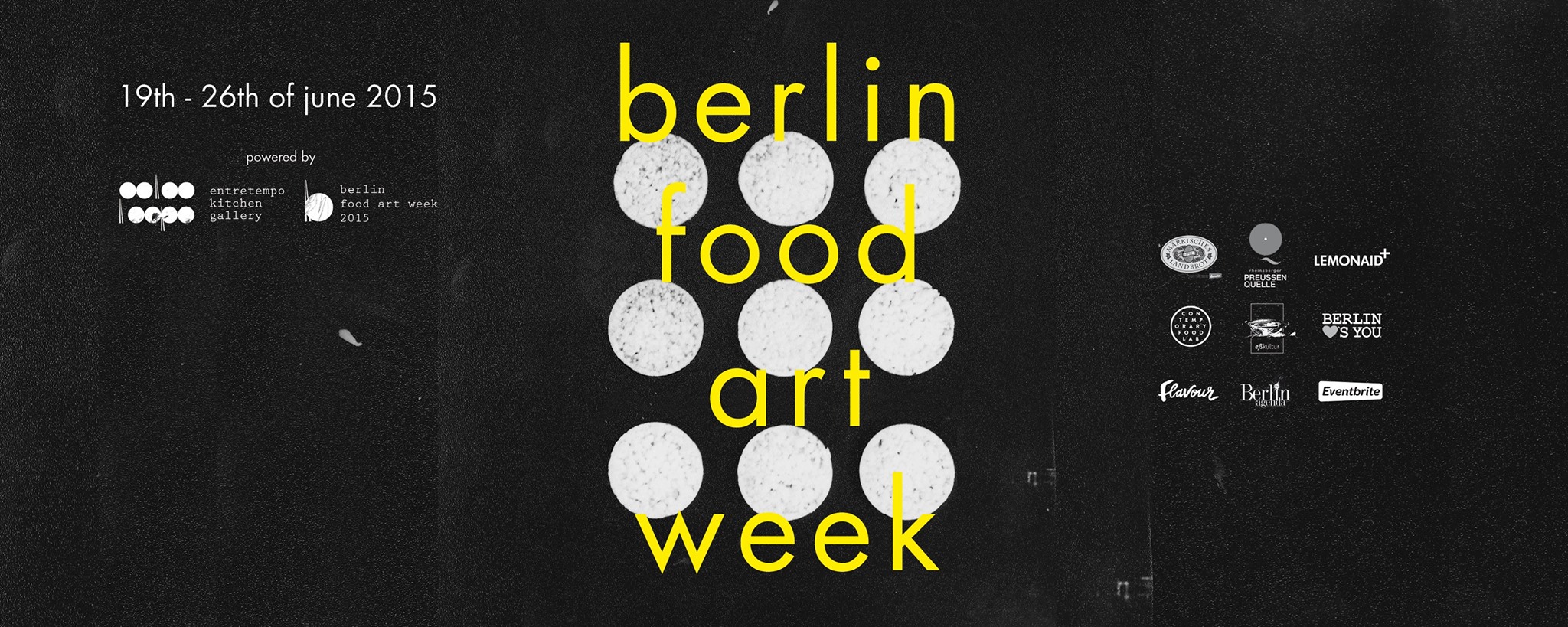
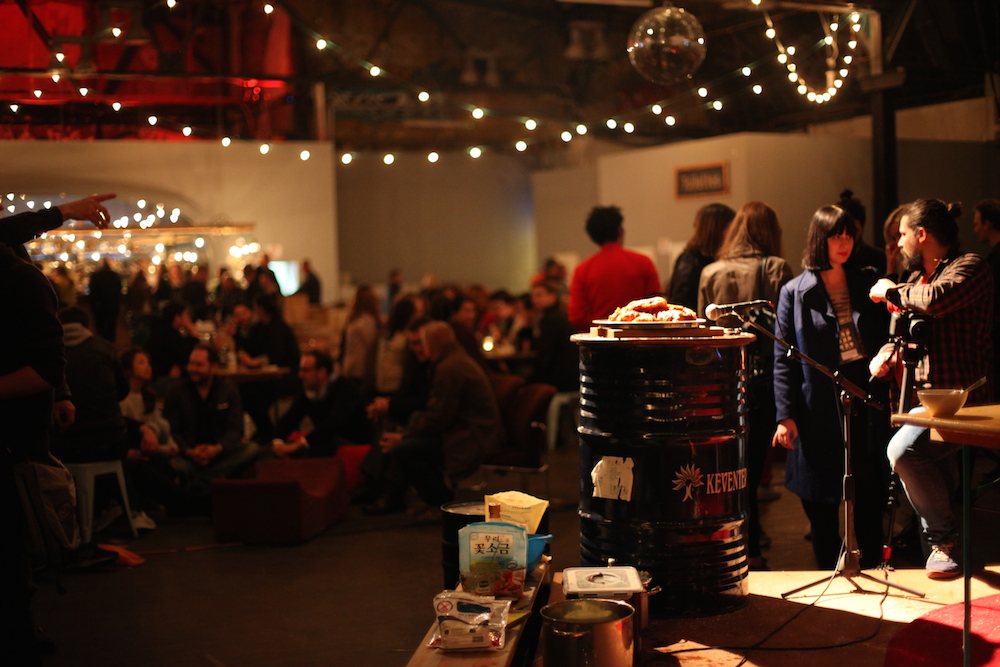
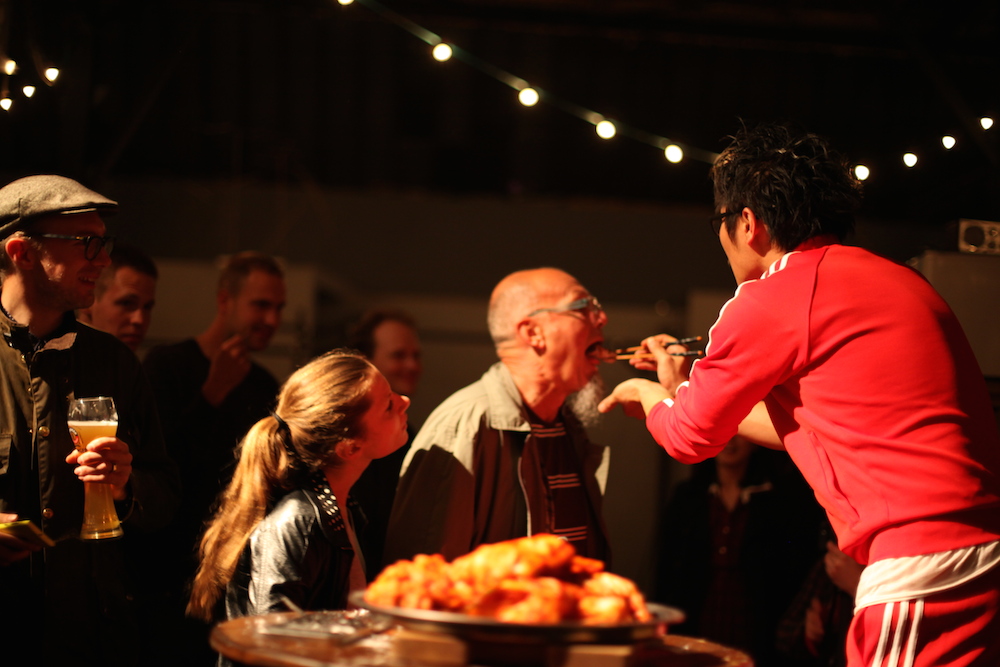
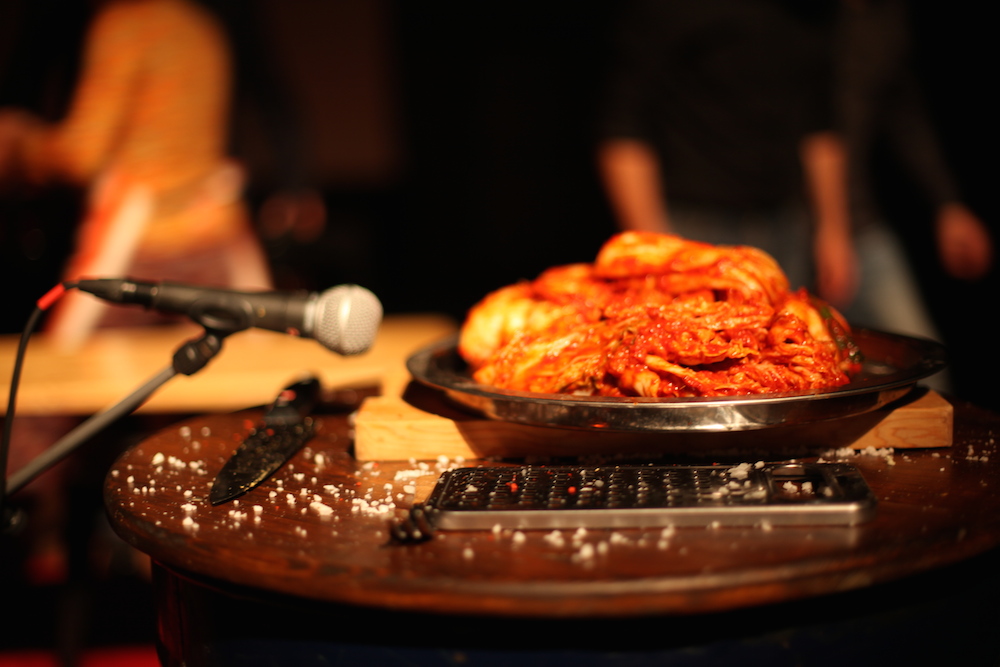
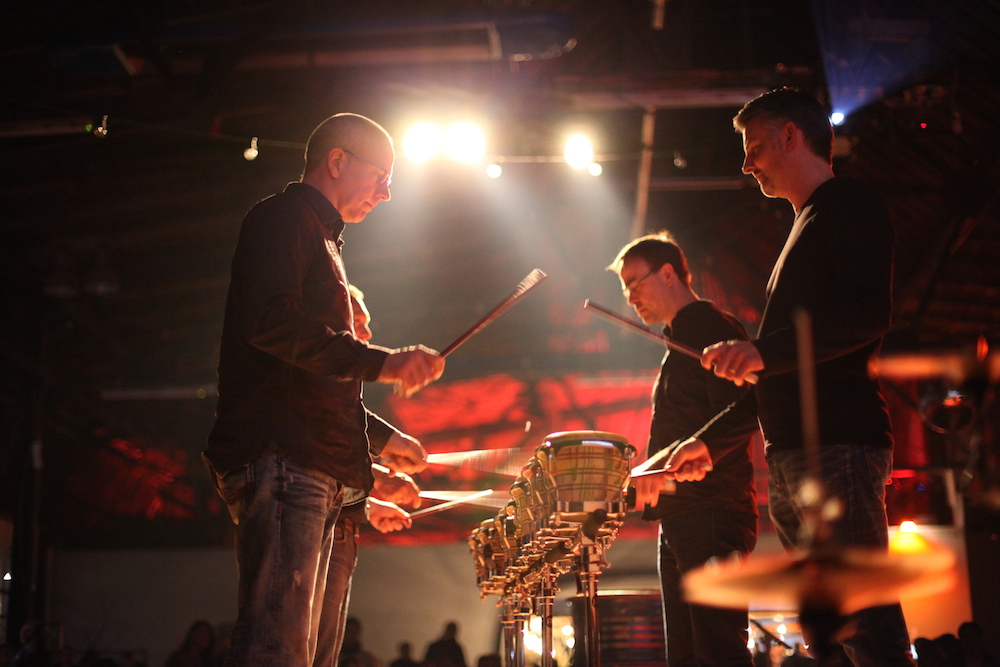
KIMCHI SESSION@NEUE HEIMAT
︎ NON論DA多
KIMCHI SESSION REVIEW
written by Fred Day ( PR / Communication team )
On June 23rd, as part of the Berlin Food Art Week, Neue Heimat hosted the second performance of The Kimchi Session, a collaborative performance between experimental percussion group, Symphonic-Percussion-Berlin and Korean artist Jinwoo Yang & architect Ido Shin.
The Kimchi Session is an evocative performance based on the traditional preparation of Korea’s national dish (Kimchi), and Yang’s personal memories of the dish. The performance transformed the act food preparation into interactive dialogue between the percussionists and the artists, where Kimchi and music were the only communication tools.
The performance was staged through a series of back-and-forth scenes between the performing artists and the percussion group. The performance started out with Yang and Shin setting up the ingredients and tools through a sequence of inquisitive searches and comic dances. Their act alluded to their personal memories in Korea, where once this everyday ritual had little communicative value for them. It was only when Yang had moved to Berlin, that he came to see the potential Kimchi had as a communication tool. Kimchi’s capability of carrying a message was realized in Yang’s search for non-verbal forms of interaction with Symphonic Percussion Berlin member Matthiessen Björn.
The performance was staged through a series of back-and-forth scenes between the performing artists and the percussion group. The performance started out with Yang and Shin setting up the ingredients and tools through a sequence of inquisitive searches and comic dances. Their act alluded to their personal memories in Korea, where once this everyday ritual had little communicative value for them. It was only when Yang had moved to Berlin, that he came to see the potential Kimchi had as a communication tool. Kimchi’s capability of carrying a message was realized in Yang’s search for non-verbal forms of interaction with Symphonic Percussion Berlin member Matthiessen Björn.
At the end of the performance the audience were invited up to taste the finished Kimchi. The relational aspect of audience interaction recalls the work of relational artist Rirkrit Tiravanija, (‘pad thai’, 1990) – the value of this kind of art is in its enabling of social interaction. Through the non-verbal dialogue of the performance, the audience were not only introduced to the way in which Korea’s national dish is made, but saw the way in which acts such as food preparation can play a communal aspect in our lives.
The Kimchi Session shows us how food can create a sense of togetherness and sharing – a central aspect of Korean food culture, and something increasingly neglected in today’s climate of “fast-food”, where food is valued only as a means to fuel the body.
BERLIN FOOD ART WEEK From 19 to 26 June, the first Berlin Food Art Week brings together galleries, art spaces, restaurants and cafes together. Organized by Entretempo Kitchen Gallery, the week focuses on discovering the different connections art can make with food and presents a wide panorama of modern and contemporary art. BFAW also shows design, photography, collages, performances, food experiences and books related to the topic.BFAW is the first pioneer event in this field and invites Galleries and foodies to join this celebration feast!
For Berlin Food Art Week 2015, Asia Contemporary Art Platform NON Berlin introduces its second ‘Kimchi Session’ —a collaboration project between two performers and a professional percussion group using Kimchi as a communication tool. Following its successful debut at NON Berlin’s guest lecture program NONDA, The Kimchi Session will meet a wider audience at Neue Heimat, one of Berlin’s busiest culture and entertainment spots.
written by Fred Day ( PR / Communication team )
On June 23rd, as part of the Berlin Food Art Week, Neue Heimat hosted the second performance of The Kimchi Session, a collaborative performance between experimental percussion group, Symphonic-Percussion-Berlin and Korean artist Jinwoo Yang & architect Ido Shin.
The Kimchi Session is an evocative performance based on the traditional preparation of Korea’s national dish (Kimchi), and Yang’s personal memories of the dish. The performance transformed the act food preparation into interactive dialogue between the percussionists and the artists, where Kimchi and music were the only communication tools.
The performance was staged through a series of back-and-forth scenes between the performing artists and the percussion group. The performance started out with Yang and Shin setting up the ingredients and tools through a sequence of inquisitive searches and comic dances. Their act alluded to their personal memories in Korea, where once this everyday ritual had little communicative value for them. It was only when Yang had moved to Berlin, that he came to see the potential Kimchi had as a communication tool. Kimchi’s capability of carrying a message was realized in Yang’s search for non-verbal forms of interaction with Symphonic Percussion Berlin member Matthiessen Björn.
The performance was staged through a series of back-and-forth scenes between the performing artists and the percussion group. The performance started out with Yang and Shin setting up the ingredients and tools through a sequence of inquisitive searches and comic dances. Their act alluded to their personal memories in Korea, where once this everyday ritual had little communicative value for them. It was only when Yang had moved to Berlin, that he came to see the potential Kimchi had as a communication tool. Kimchi’s capability of carrying a message was realized in Yang’s search for non-verbal forms of interaction with Symphonic Percussion Berlin member Matthiessen Björn.
At the end of the performance the audience were invited up to taste the finished Kimchi. The relational aspect of audience interaction recalls the work of relational artist Rirkrit Tiravanija, (‘pad thai’, 1990) – the value of this kind of art is in its enabling of social interaction. Through the non-verbal dialogue of the performance, the audience were not only introduced to the way in which Korea’s national dish is made, but saw the way in which acts such as food preparation can play a communal aspect in our lives.
The Kimchi Session shows us how food can create a sense of togetherness and sharing – a central aspect of Korean food culture, and something increasingly neglected in today’s climate of “fast-food”, where food is valued only as a means to fuel the body.
BERLIN FOOD ART WEEK From 19 to 26 June, the first Berlin Food Art Week brings together galleries, art spaces, restaurants and cafes together. Organized by Entretempo Kitchen Gallery, the week focuses on discovering the different connections art can make with food and presents a wide panorama of modern and contemporary art. BFAW also shows design, photography, collages, performances, food experiences and books related to the topic.BFAW is the first pioneer event in this field and invites Galleries and foodies to join this celebration feast!
For Berlin Food Art Week 2015, Asia Contemporary Art Platform NON Berlin introduces its second ‘Kimchi Session’ —a collaboration project between two performers and a professional percussion group using Kimchi as a communication tool. Following its successful debut at NON Berlin’s guest lecture program NONDA, The Kimchi Session will meet a wider audience at Neue Heimat, one of Berlin’s busiest culture and entertainment spots.
︎ NON論DA多